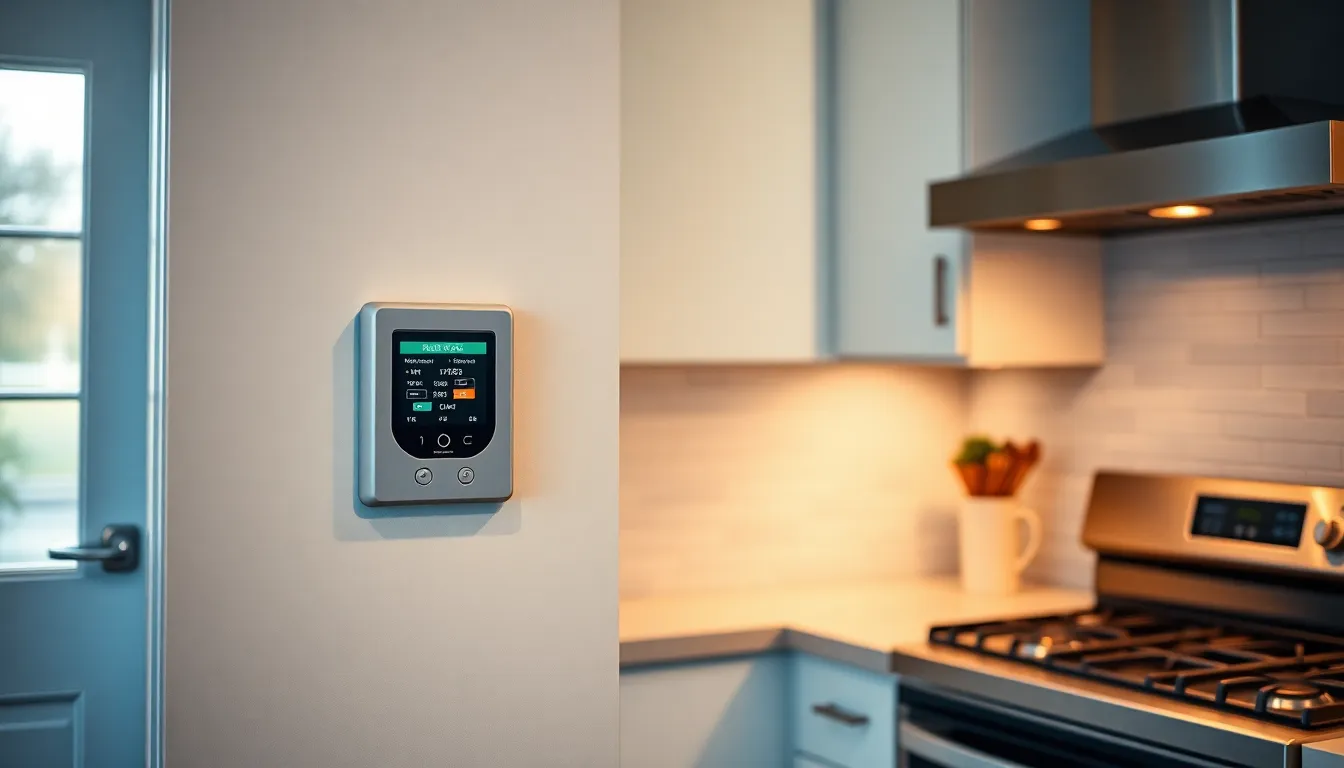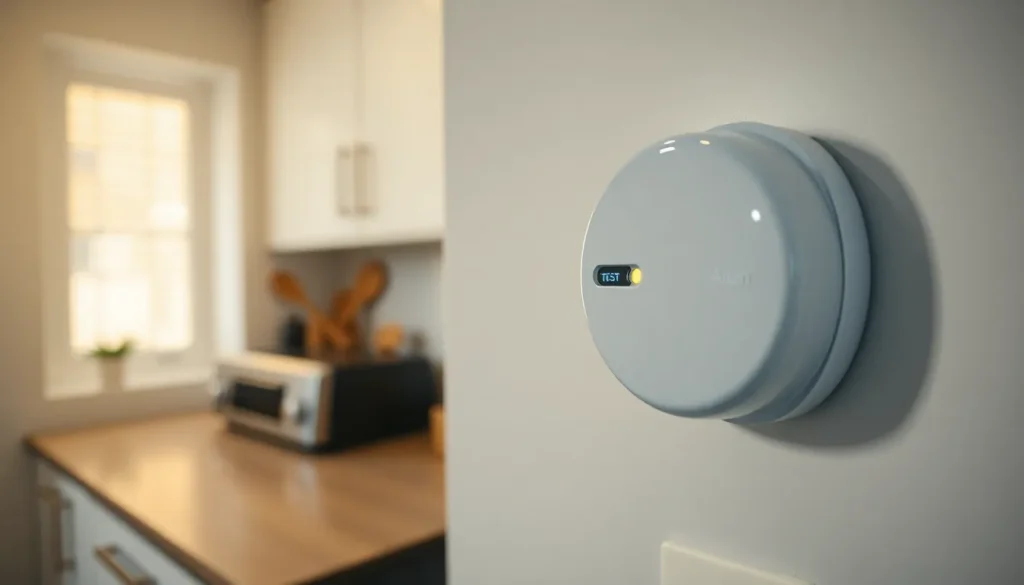Table of Contents
ToggleWhen it comes to home safety, natural gas alarms might not be the first thing that pops into your mind. But let’s face it—nobody wants their cozy abode to turn into a scene from a disaster movie. Natural gas is odorless and invisible, making it the sneaky villain in your home. A reliable alarm can be your superhero, swooping in to save the day before things get out of hand.
Imagine curling up on the couch with a good book, only to be interrupted by a loud beep that says, “Hey, you’ve got a gas leak!” It’s not just a wake-up call; it’s a lifesaver. Investing in a natural gas alarm not only protects your loved ones but also gives you peace of mind. So why wait? Let’s dive into why every home should have one of these trusty gadgets on guard.
Overview of Natural Gas Alarms
Natural gas alarms serve as essential devices for detecting gas leaks in residential settings. These alarms detect methane, a primary component of natural gas, and provide alerts when unsafe levels are present. Detecting methane quickly is vital because it lacks color and smell.
Features vary among different models. Some alarms include visual indicators, while others provide audible alerts. Many systems offer smart technology integration, allowing notifications directly to smartphones. Choosing a model with these features ensures timely actions during emergencies.
Installation often involves placing the alarm near potential leak sources, such as gas stoves, furnaces, or water heaters. Compliance with local building codes may dictate specific installation practices. Regular testing is crucial for maintaining the alarm’s effectiveness; manufacturers typically recommend testing at least once a month.
Battery-powered models offer flexibility for placement, while hard-wired options provide consistent power. Users benefit from alarms that combine smoke and carbon monoxide detection, enhancing overall safety. Replacement of sensors usually occurs every five to seven years, depending on the manufacturer’s guidelines.
Homeowners should prioritize alarms that meet Underwriters Laboratories (UL) standards for reliability. Investing in quality devices enhances the protection of loved ones and improves overall safety at home. Regular maintenance and awareness of the alarm’s functions contribute significantly to the effectiveness of these safety measures.
Importance of Natural Gas Alarms in Homes

Natural gas alarms play a vital role in home safety. They provide immediate alerts to homeowners about potential gas leaks, addressing the hidden risks of natural gas.
Safety Benefits
Detecting gas leaks early prevents dangerous situations. Homeowners appreciate the peace of mind that comes with a reliable alarm. Effective alarms can detect methane, the main component of natural gas, quickly. With visual indicators and audible alerts, households stay informed of any issues. Smart technology features enhance safety by sending notifications directly to smartphones. Their placement near gas appliances, like stoves and furnaces, is essential for optimal performance. Many jurisdictions require compliance with building codes, emphasizing the importance of strategic installation and maintenance.
Environmental Impact
Natural gas alarms help minimize environmental damage. By quickly identifying leaks, they prevent harmful methane from entering the atmosphere. Methane possesses a significantly higher warming potential than carbon dioxide, making its reduction critical. Alarms contribute to reducing emissions, supporting efforts against climate change. Homeowners play a crucial role in promoting sustainability through these devices. Effective detection systems align with eco-friendly practices, reinforcing the commitment to a healthier planet. As awareness grows, investing in a gas alarm translates into both personal safety and environmental responsibility.
Types of Natural Gas Alarms
Natural gas alarms come in various types, each designed to detect gas leaks effectively. Homeowners should understand the differences between these options to choose the right alarm for their safety needs.
Ionization Alarms
Ionization alarms primarily detect fast-flaming fires and can sense specific gas leaks, especially those with high combustion rates. These devices use a small amount of radioactive material to ionize air and create a current. When gas displaces this current, it triggers an alarm. Installing ionization alarms near areas with potential gas sources enhances safety. Regular testing ensures continued functionality, making it essential for homeowners to check these devices monthly.
Photoelectric Alarms
Photoelectric alarms excel at detecting smoldering fires and also identify natural gas leaks. Unlike ionization models, they utilize a light sensor that responds to changes in light patterns caused by gas particles. Positioning these alarms in locations such as kitchens or near furnaces offers better coverage against potential leaks. They tend to reduce false alarms compared to ionization alarms. Monthly testing and maintenance are crucial to keep photoelectric alarms functioning effectively.
Features to Consider When Choosing a Natural Gas Alarm
Choosing the right natural gas alarm requires careful consideration of several features.
Sensitivity Levels
Sensitivity levels determine how quickly an alarm detects gas leaks. Some alarms monitor very low concentrations, while others respond only to higher levels. Models designed for quick detection help prevent dangerous situations, making them preferable for home safety. Look for alarms with a range of sensitivity settings that suit specific household needs. Therefore, checking product specifications ensures the alarm meets individual detection requirements.
Power Source Options
Power source options are essential for consistent performance of natural gas alarms. Battery-operated alarms offer convenience but require regular battery checks and replacements. Hard-wired alarms connect directly to a home’s electrical system, eliminating the need for battery changes. Consider choosing models with backup batteries to maintain functionality during power outages. Evaluating both options allows homeowners to select alarms that align best with their lifestyle and preferences.
Installation and Maintenance Tips
Proper installation is vital for natural gas alarms. Homeowners should place alarms near potential leak sources such as gas stoves and furnaces. Compliance with local building codes ensures safety and effectiveness. Some manufacturers provide specific instructions for optimal placement.
Testing alarms regularly plays a key role in maintenance. Monthly tests confirm functionality and reliability. Homeowners should follow product guidelines for testing procedures. Common practice includes pressing the test button to ensure the alarm sounds correctly.
Battery-powered alarms require consistent attention. Checking batteries every six months prevents lapses in performance. When replacing batteries, use high-quality options recommended by the manufacturer. For hard-wired alarms, homeowners should inspect connections annually.
Cleaning alarms contributes to their longevity. Dust and debris can affect sensitivity. Gently wiping the alarm with a soft cloth ensures accurate detection. Homeowners should also avoid positioning alarms near ceiling fans or vents, which can interfere with performance.
Sensitivity levels of alarms should match detection needs. Homeowners must choose models that promptly alert them to leaks. Researching specific features helps ensure the right alarm selection. Alarms meeting Underwriters Laboratories standards provide additional peace of mind.
Backup batteries are an essential feature. They maintain functionality during power outages. Homeowners should opt for models that integrate both hard-wired connections and battery backups. Doing so prepares them for unexpected situations.
Monitoring alarm performance also enhances safety. It’s advisable to replace alarms every five to ten years, depending on manufacturer guidelines. Keeping records of installation and maintenance dates aids in staying organized. Proper care and attention maximize the effectiveness of natural gas alarms, ensuring safety at home.
Investing in a natural gas alarm is a proactive step toward ensuring home safety. These devices not only detect potential leaks but also provide peace of mind for families. With various options available homeowners can choose alarms that best fit their needs and preferences.
Regular testing and maintenance are essential for optimal performance. By placing alarms near potential gas sources and adhering to local building codes homeowners can significantly reduce the risks associated with natural gas. Additionally choosing models that meet UL standards ensures reliability and effectiveness.
Ultimately a natural gas alarm is not just a safety measure; it’s a commitment to protecting loved ones and contributing to a healthier environment. Prioritizing this investment reflects a dedication to safety and sustainability.





